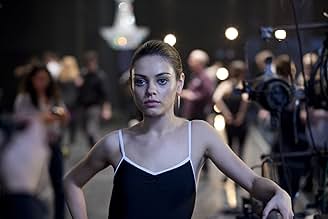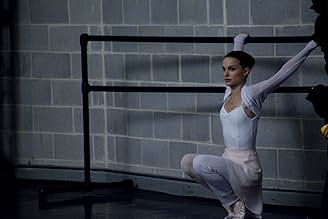Una bailarina comprometida obtiene el papel principal en una producción de el Lago de los Cisnes de Tchaikovsky, lo cual pondrá a prueba su cordura.Una bailarina comprometida obtiene el papel principal en una producción de el Lago de los Cisnes de Tchaikovsky, lo cual pondrá a prueba su cordura.Una bailarina comprometida obtiene el papel principal en una producción de el Lago de los Cisnes de Tchaikovsky, lo cual pondrá a prueba su cordura.
- Ganó 1 premio Óscar
- 98 premios y 279 nominaciones en total
Abraham Aronofsky
- Mr. Stein
- (as Abe Aronofsky)
- …
Argumento
¿Sabías que...?
- CuriosidadesDarren Aronofsky told journalist Kim Masters in a radio interview (KCRW's "The Business" broadcast February 14, 2011) that Natalie Portman not only trained for a year as a dancer to prepare for the role, but paid for the training out of her own pocket until the film found investors. Aronofsky attributed the film getting made at all to Portman's dedication and enthusiasm.
- Pifias(at around 24 mins) When Nina returns home and looks for her mother, after being assigned a role, a camera operator is visible in a mirror.
- Créditos adicionalesMany cast members are credited both as their role in this film and said character's corresponding role in the Swan Lake ballet
- Banda sonoraApotheosis
Written and Performed by Peter Min (as Pete Min)
Contains "Swan Lake" written by Pyotr Ilyich Tchaikovsky
Reseña destacada
Darren Aronofsky's "Black Swan" makes ballet cool—and if that isn't a Herculean feat in itself, I don't know what is. It also happens to be one of the best films of the year, featuring one of the best performances of the year. Natalie Portman will be nominated for her devastating portrayal of petite perfectionist Nina the ballerina or I'll pull a Werner Herzog and eat my shoe.
"Black Swan" is cut from the same cloth as Aronofsky's 2008 film "The Wrestler," if at the opposite end. Interestingly, before either project was realized, the director was reportedly mulling a drama about the relationship between a professional wrestler and a ballerina. Somewhere along the way, however, that concept was split down the middle—and thank God. "Black Swan" is brilliant, but it wouldn't necessarily play well with others.
Like its predecessor, the film examines a physically demanding and widely unappreciated art, and though thematically similar, the two complement each other via mutually exclusive cinematic vernaculars. "The Wrestler" is ultimately a safer film. Its emotional experience is directly conveyed via plot and dialogue. What Aronofsky attempts with "Black Swan" is riskier: he plays genre Frankenstein, taking established themes and transplanting them into that which feels initially least appropriate—horror.
Yet despite certain unmistakable cues, I'd hesitate to call "Black Swan" a horror film. Visually, maybe, but John Carpenter insists "The Thing" is a Western, and likewise there is more to "Black Swan" than is aesthetically obvious. It probably best fits the psychological thriller mold, but as Aronofsky suggests through his manipulation of mirrors, it is not a film that ever casts a clear reflection. For me, that dichotomy is what makes it so fascinating and rewarding.
"Black Swan" strikes an immediate haunting note that seems to grow louder with reverberation rather than quieter. In the first half, the director lays track work; in the second, he runs right off it. Nina begins her journey receiving the coveted role of the Swan Queen in a modernist production of Tchaikovsky's "Swan Lake." Her practiced technique makes her ideal for the role of the goodly White Swan, but her lascivious director (Vincent Cassel) has reservations about her ability to portray her evil twin, the titular Black Swan—a character that embodies impulse and lust. Nina's process of unlearning takes her to increasingly dark, surreal depths.
The final act of the film comprises the most riveting 40 minutes I've seen on screen all year, though "Black Swan" is never the mindf**k some have improperly labeled it. Aronofsky deliberately builds atmosphere and anticipation toward a Kubrickian climax that is at once obvious and stunning. Tchaikovsky's score falls like an aerial assault, and that inherent theatricality collides with Aronofsky's narrative as they come to a dual boil.
Perhaps best of all, however, is that for all the audacity on display, the director knows when to dial it back as well. The casting of Mila Kunis ("Forgetting Sarah Marshall," "That 70's Show") was idyllic. She plays a comic relief of sorts, with a comely, down-to-earth veneer but viperous eyes. Her performance is fantastically calculated—she provides derisive, but much needed perspective on Nina's deteriorating sense of reality.
"Black Swan" is a wholly effective work born from the shadowy underside of the mind, anchored by a career-defining turn by Portman. It is a quick, impulsive piece, but it explains artistic devotion and the consuming nature of obsession as well or better than any film I've ever seen. In hindsight, it feels more characteristic of the filmmaker responsible for "Pi" and "Requiem for a Dream" than "The Wrestler," though the parallels between it and "Black Swan" run deep.
They may be cut from the same cloth, but the difference between the two is as stark as black and white. Hail Aronofsky, the Swan King.
"Black Swan" is cut from the same cloth as Aronofsky's 2008 film "The Wrestler," if at the opposite end. Interestingly, before either project was realized, the director was reportedly mulling a drama about the relationship between a professional wrestler and a ballerina. Somewhere along the way, however, that concept was split down the middle—and thank God. "Black Swan" is brilliant, but it wouldn't necessarily play well with others.
Like its predecessor, the film examines a physically demanding and widely unappreciated art, and though thematically similar, the two complement each other via mutually exclusive cinematic vernaculars. "The Wrestler" is ultimately a safer film. Its emotional experience is directly conveyed via plot and dialogue. What Aronofsky attempts with "Black Swan" is riskier: he plays genre Frankenstein, taking established themes and transplanting them into that which feels initially least appropriate—horror.
Yet despite certain unmistakable cues, I'd hesitate to call "Black Swan" a horror film. Visually, maybe, but John Carpenter insists "The Thing" is a Western, and likewise there is more to "Black Swan" than is aesthetically obvious. It probably best fits the psychological thriller mold, but as Aronofsky suggests through his manipulation of mirrors, it is not a film that ever casts a clear reflection. For me, that dichotomy is what makes it so fascinating and rewarding.
"Black Swan" strikes an immediate haunting note that seems to grow louder with reverberation rather than quieter. In the first half, the director lays track work; in the second, he runs right off it. Nina begins her journey receiving the coveted role of the Swan Queen in a modernist production of Tchaikovsky's "Swan Lake." Her practiced technique makes her ideal for the role of the goodly White Swan, but her lascivious director (Vincent Cassel) has reservations about her ability to portray her evil twin, the titular Black Swan—a character that embodies impulse and lust. Nina's process of unlearning takes her to increasingly dark, surreal depths.
The final act of the film comprises the most riveting 40 minutes I've seen on screen all year, though "Black Swan" is never the mindf**k some have improperly labeled it. Aronofsky deliberately builds atmosphere and anticipation toward a Kubrickian climax that is at once obvious and stunning. Tchaikovsky's score falls like an aerial assault, and that inherent theatricality collides with Aronofsky's narrative as they come to a dual boil.
Perhaps best of all, however, is that for all the audacity on display, the director knows when to dial it back as well. The casting of Mila Kunis ("Forgetting Sarah Marshall," "That 70's Show") was idyllic. She plays a comic relief of sorts, with a comely, down-to-earth veneer but viperous eyes. Her performance is fantastically calculated—she provides derisive, but much needed perspective on Nina's deteriorating sense of reality.
"Black Swan" is a wholly effective work born from the shadowy underside of the mind, anchored by a career-defining turn by Portman. It is a quick, impulsive piece, but it explains artistic devotion and the consuming nature of obsession as well or better than any film I've ever seen. In hindsight, it feels more characteristic of the filmmaker responsible for "Pi" and "Requiem for a Dream" than "The Wrestler," though the parallels between it and "Black Swan" run deep.
They may be cut from the same cloth, but the difference between the two is as stark as black and white. Hail Aronofsky, the Swan King.
- colinrgeorge
- 17 oct 2010
- Enlace permanente
Selecciones populares
Inicia sesión para calificar y añadir a tu lista para recibir recomendaciones personalizadas
Detalles
- Fecha de lanzamiento
- País de origen
- Sitio oficial
- Idiomas
- Títulos en diferentes países
- El cigne negre
- Localizaciones del rodaje
- Empresas productoras
- Ver más compañías en los créditos en IMDbPro
Taquilla
- Presupuesto
- 13.000.000 US$ (estimación)
- Recaudación en Estados Unidos y Canadá
- 106.954.678 US$
- Fin de semana de estreno en EE. UU. y Canadá
- 1.443.809 US$
- 5 dic 2010
- Recaudación en todo el mundo
- 329.398.046 US$
Contribuir a esta página
Sugerir un cambio o añadir el contenido que falta









































